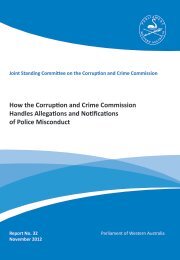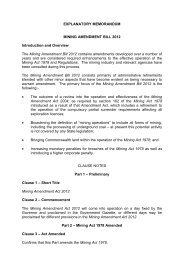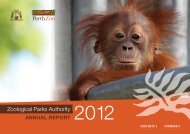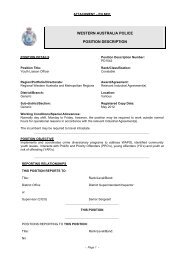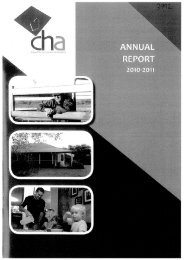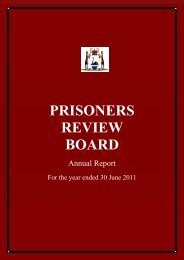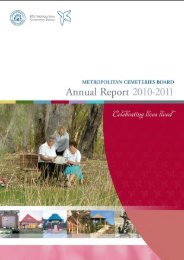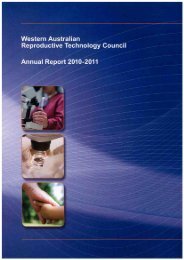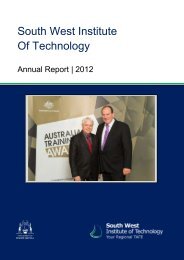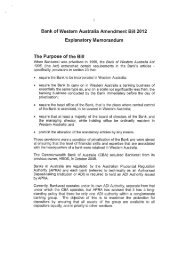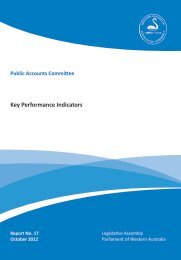Challenger TAFE | Annual Report 2006 - Parliament of Western ...
Challenger TAFE | Annual Report 2006 - Parliament of Western ...
Challenger TAFE | Annual Report 2006 - Parliament of Western ...
Create successful ePaper yourself
Turn your PDF publications into a flip-book with our unique Google optimized e-Paper software.
80 <strong>Challenger</strong> <strong>TAFE</strong> | <strong>Annual</strong> <strong>Report</strong> <strong>2006</strong><br />
12.8 Public Interests Disclosures<br />
In accordance with the Public Interest Disclosure Act 2003 policy, procedures and guidelines for staff and informants have been<br />
developed and approved. During the calendar year <strong>2006</strong> <strong>Challenger</strong> <strong>TAFE</strong> did not receive any Public Interest Disclosures.<br />
12.9 Public Sector Standards and Ethical Codes<br />
<strong>Challenger</strong> <strong>TAFE</strong> complied with all Public Sector Standards in Human Resource Management and Public Sector Ethical Codes<br />
in <strong>2006</strong>. There were four breaches lodged against the Recruitment, Selection and Appointment Standard, however none was<br />
upheld. There were no other breaches lodged against any <strong>of</strong> the other Standards or Ethical Codes.<br />
12.10 Regional Development Policy<br />
<strong>Challenger</strong> <strong>TAFE</strong> is responsive to the needs <strong>of</strong> its region in researching, developing and delivering training and related services<br />
which support the development <strong>of</strong> individuals, industry, and communities. In 2005-<strong>2006</strong>, the College’s planning, program and<br />
service delivery were guided by specifi c strategies listed in the Government’s Regional Development Policy. Conformance with<br />
Regional Development Policy requirements is reported under Chapter 13 Financial Statements.<br />
12.11 <strong>Report</strong>ing and Recordkeeping Plans<br />
As prescribed by the State Records Act 2000, State Records Commission Principles and Standards (Standard 2, Principle 6):<br />
The effi ciency and effectiveness <strong>of</strong> the Record Keeping system<br />
A Records Management Baseline Audit was conducted by the Department <strong>of</strong> Education and Training’s Internal Assurance<br />
Directorate including all <strong>TAFE</strong> Colleges. The objectives <strong>of</strong> this audit were to determine compliance with:<br />
• The State Records Commission Standard 2 Record Keeping Plans; and<br />
• The policies relating to government record keeping.<br />
Record Keeping Training Program<br />
The College will implement an online record keeping awareness and induction course in 2007 in order to further enhance staff<br />
exposure to record keeping responsibilities.<br />
• To measure the effi ciency and effectiveness <strong>of</strong> the record keeping training program, an informal process <strong>of</strong> monitoring and<br />
review is undertaken to determine the level <strong>of</strong> understanding exhibited by staff with record keeping responsibilities.<br />
• The organisation’s induction program - a review is to be made <strong>of</strong> the College record keeping induction information in 2007.<br />
Presently, staff are directed to the College policy and procedures that are available on the intranet.<br />
12.12 Sustainability Action Plan<br />
1. Social sustainability – contribution to developing social capital and capacity building<br />
• The WA Centre for Leadership and Community Development and the Centre for Adult Education have particular briefs relating<br />
to building social capital and social sustainability. Their activities in relation to special groups are reported above in Access and<br />
Equity and Disability Services Plan, and in Chapter 11.<br />
• A comprehensive student support program is provided by Client Services and their support programs are reported above in<br />
Access and Equity and Disability Services Plan Outcomes.<br />
2. Economic Sustainability – elements <strong>of</strong> organisational and fi nancial sustainability<br />
• Establishment <strong>of</strong> a Sustainability Group at the Murdoch Campus to address and implement sustainable strategies as a model<br />
for other campuses. See also Chapter 11 for details or organisational sustainability.<br />
• Development <strong>of</strong> Business Management Plans:<br />
o for the Murdoch Campus;<br />
o for the Murdoch Campus’ surrounding bush lands;<br />
o formation <strong>of</strong> a community group, Friends <strong>of</strong> Murdoch Bush Lands;<br />
o formation <strong>of</strong> a Campus sustainability group <strong>of</strong> staff and potentially students (2007)<br />
• Environmental Management students conducted sustainability audits in the areas <strong>of</strong> waste management, water use and energy<br />
use <strong>of</strong> the Murdoch Campus<br />
• Production <strong>of</strong> the third information CD for students/employers and general promotion <strong>of</strong> courses and campus information for<br />
students <strong>of</strong> the WA Horticulture and Environmental Science Skills Centre



